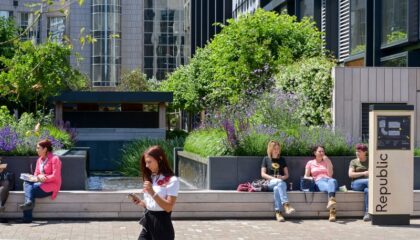At the COP26 UN Climate Change Conference, heads of state put forward their ambitions and proposals for securing global Net Zero carbon emissions, designed to keep the 1.5C temperature increase Paris Agreement target within reach.
The UKGBC emphasises that for the built environment, 80% of the buildings that will be in use in 2050 already exist today. According to them, retrofitting offers the greatest opportunity to utilise greener solutions and reap their benefits. With many buildings, only one refurbishment cycle away from hitting the Net Zero target, the time for action is now.
In its latest report, Whole Life Carbon Roadmap: A Pathway to Net Zero, the UKGBC calls for the introduction of performance-based rating schemes for non-domestic buildings, which would include mandatory energy performance disclosure and fiscal incentives for large office buildings by 2025.
At Workman, we know this kind of action speaks louder than words, which is why we are currently devising Net Zero Asset Plans for nearly 2 million sq. ft of assets and new developments, on behalf of clients driving towards Net Zero targets by 2050 or earlier.
ESG collaboration with project teams
Through our ESG Project Advisor service, led by Hedley Jones, Partner, Head of ESG Refurbishment and Development, we are also providing practical ESG action oversight. Additionally, input on residential, industrial, office and retail schemes. The combined project value is nearly £500m. We collaborate with project teams to go beyond business as usual throughout the project lifecycle. This involves exploring design opportunities and material innovations to enhance the sustainability outcomes of the final product.
We also regularly create fit-out, refurbishment, retrofit and development frameworks for investor clients. These establish specific guidance and targets. They help project teams deliver to Net Zero and wider ESG targets, beyond current statutory compliance. Over the past year, our team has developed and implemented customised frameworks for three prominent global fund managers. We set benchmark standards for projects across their portfolios, spanning almost 40 million sq. ft of real estate.
Reducing energy consumption
To address rising energy costs, our teams have focused on reducing grid energy demand and consumption. This is to mitigate volatility in gas market pricing and minimising environmental impact for our clients. In the race to Net Zero, an Energy Audit is often the place to begin.
One recent goal was to reduce energy demand by almost one third at our client’s 254,000 sq. ft office building. Workman’s ESG Project Advisor and Venture, as well a Workman’s Project Management team, achieved a significant milestone. They successfully reduced energy demand by 31%, resulting in this remarkable accomplishment. This was through improvements to building fabric and mechanical and electrical plant, at the central Birmingham site.
We recommended the implementation of smart metering across a diverse portfolio of nine properties. This represents 80% of our client’s total energy consumption and a spend of over £2.3 million. By implementing a monitoring and targeting strategy that utilises real-time granular data, we achieved a 20% reduction in energy consumption. In the first year, we achieved these savings across all landlord-controlled meters, resulting in annual savings of nearly £500,000.
Through mechanical and electrical improvements, another case achieved a remarkable 78% reduction in energy demand. This was accomplished by introducing an air-source heat pump in a 36,500 sq. ft office refurbishment.
At another location, an 18,000 sq. ft office refurbishment saw the removal of gas boilers. The property now utilises air-source heat pumps to provide hot water and heating for common areas. As a result, the property relies solely on electricity that is 100% REGO-backed or sourced from onsite renewable generation.
Despite often being overlooked and considered challenging in terms of decarbonisation, these smaller-scale buildings have demonstrated significant achievements.
Decarbonisation through clean energy
On behalf of our clients, our teams are progressively investigating transitions to clean energy. At Workman, we advocate practical ESG action. We utilise enhanced energy modelling to test the viability of solutions for carbon-emissions reductions and alternative designs. Recently, we demonstrated the effectiveness of this across a new-build residential portfolio of 1,105,000sq. ft. There, the introduction of solar PV arrays on some buildings led to a carbon saving of 18.5%, or 19 tonnes of CO2 per year. This is especially important. The energy supply sector is the largest contributor to global greenhouse gas emissions, responsible for around 35% of total emissions. This is according to the IPCC (Intergovernmental Panel on Climate Change).
Reduce embodied carbon
Workman’s ESG experts are working to targets set by organisations such as LETI. We want to ensure that we are delivering our clients’ ambitions. Whole-life carbon assessments are delivered on new-build industrial developments of 710,000sq ft. Additionally, residential development of 600,000 sq. ft has been undertaken. This helps establish a baseline position for setting embodied and whole life carbon reduction targets during subsequent design stages.
Building automation and data
A further tool in our armoury is IBOS, our intelligent building operating system. It allows for the analysis and real-time optimisation of buildings. The technology has recently been introduced to an office refurbishment scheme to allow for monitoring and control of energy demands, allowing operational carbon reduction strategies and targets to be established.
Transport and active commuting
A global transition to zero-emission transport is a priority since transportation is estimated to account for 20% of global emissions each year. This is also high up the to-do list for Workman’s teams.
Workman has driven active-commuting projects, such as introducing CyclingScore Platinum-rated facilities at Glasgow’s Skypark. Additionally, we have expertise in facilitating electric-car charging amenities.
Workman’s Building Consultancy team is currently managing the installation of the largest EV charging hub in the UK, with 236 electric-car charging points being installed in London’s Brent Cross shopping centre car parks over the next five years.
The first phase installed 50 fast-charging points in the multi-storey car park and two ultra-rapid charging points in the western overflow car park.
The chargers are operated by Franklin Energy as part of its Life Network, with engineering consultancy delivered by Hilson Moran, on behalf of joint centre owners Hammerson and Aberdeen Standard Investments, as reported in Property Week.
Biodiversity for sustainable and healthy communities
Workman teams on the ground continue to deliver social value across our portfolio of managed properties. Not least at Central Retail Park in Falkirk, where the on-site team created a garden that not only delivers biodiversity, but also provides a place for work breaks, as well as community sustainability education. The garden, which was recently awarded the inaugural Health and Wellbeing Award at the Property Week Awards, allows people to learn new skills, socialise, and become more engaged with the environment, community workshops include building projects, planting, growing and garden development.
We are proud partners of the Natural History Museum’s Urban Nature Project, which is not only creating an unparalleled green space at the Museum’s five-acre London site, but also a national movement, which aims to address the disconnect between UK people and nature.
With growing awareness of the connections between climate and biodiversity, increasing biodiversity within urban environments is a huge challenge, especially since Natural History Museum research revealed that with an average of only 53% of its biodiversity left, the UK is in the bottom 10% of the world’s nations.
Enhancing Biodiversity: preserving nature in Workman’s managed portfolio
Our commitment to Building Biodiversity across the Workman-managed portfolio is driven through practical ESG action with our Biodiversity Toolkit. One sign of our efforts is the prevalence of bees: often used as a symbol of biodiversity, bees are key to pollination and thriving natural environments. By driving practical ESG action throughout the project lifecycle, we strive to create lasting positive impacts and contribute to a more sustainable built environment.
At Workman, 14 of our managed sites including Maybird Shopping Park in Stratford-upon-Avon play host to bees, with an average of six hives each. These 84 hives can produce up to 150 jars of honey per site per year. That’s a potential 2,100 jars of honey, which is usually harvested between May – September. Each beehive is worth £800 to the wider economy, according to economist and climate finance reformer Dr Mark Carney’s estimation on the value of bees.
Exploit every ESG opportunity to achieve Net Zero
To meet the future challenges of climate change, we’re looking to exploit every opportunity across the practical ESG action spectrum. We will investigate opportunities such as; solar PV, solar hot water, electric-vehicle charging, LED lighting replacements, air and ground source heat-pump technology, removal of gas supplies, intelligent building technology, improving building thermal fabric, biodiversity improvements as well as health and wellbeing enhancements.
Want to know more about our ESG services and our ESG Project Advisor service?
Find out more about Creating Zero Carbon Buildings.
Read more about Building Wellbeing for a Better Workplace.



